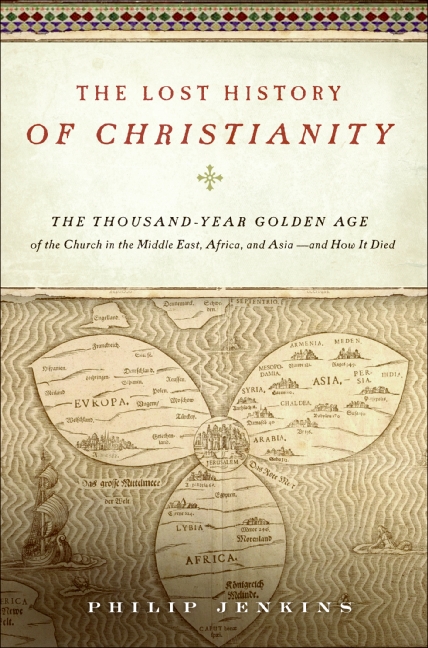Jonathan Phillips: Holy Warriors; Philip Jenkins: The Lost History of Christianity

 Jonathan Phillips, Holy Warriors: A Modern History of the Crusades (London: The Bodley Head, Random House, 2009), 424 pages, ISBN 9780224079372.
Jonathan Phillips, Holy Warriors: A Modern History of the Crusades (London: The Bodley Head, Random House, 2009), 424 pages, ISBN 9780224079372.
Philip Jenkins. The Lost History of Christianity: The Thousand Year Golden Age of the Church in the Middle East, Africa and Asia—and How It Died (New York: HarperOne, 2008), 315 pages, ISBN 9780061472800.
If you would read back-to-back, as I did recently, the two books reviewed here, one by a historian of the Crusades and another by a Church historian on the Eastern Church, you will surely broaden your knowledge of world history and gain a surprising perspective on both ecumenism and the prospects of peace with religious extremism.
Both of these books are a good overview of the battlefield called “jihad” by Muslims and “Crusade” by Christians and contain insights into the mistakes made as well as ways people have been successful in working together, though the mistakes far outweigh what went right. Jonathan Phillips is the expert on Crusades history and European medieval secular and religious politics, while Philip Jenkins addresses religious matters in-depth.
We ought to grasp that no movement in the history of humanity was either simple or pure.
If we might borrow from Socrates’ saying, “The unexamined life is not worth living,” we ought to grasp that no movement in the history of humanity was either simple or pure. Phillips does a good job of sustaining the point that both the call to Crusade by popes and the response from the nobles and people was a mixture of sincerely held religious beliefs and the desire for success, power and wealth. Moderns like to say that the Crusades show what is wrong with religion and the Church, but leave out (probably from ignorance) that the Crusades began with a request from Christians in the Middle East, not a European desire for a blood frenzy. However, what Pope Urban II in 1095 decided to do with the appeal from Emperor Alexius of Constantinople and each and every occasion for “taking the cross’ until the reconquest of Granada in 1492 was a mixture of piety and pride resulting in the waste of human lives as well as multiple failures in the goals they hoped to achieve. For example, what the Emperor had in mind was a special forces team of perhaps 300 knights but what happened was one of history’s first carefully orchestrated international public relations campaigns, resulting in an army of tens of thousands of princes and peasants on a long march to Jerusalem. The misdeeds and missteps along the way are well known, but Phillips’ research is highly informative and I learned a great deal. As he points out, it is amazing that those in the First Crusade were successful at all, yet they were the most successful of all.
Category: Church History, Summer 2010


